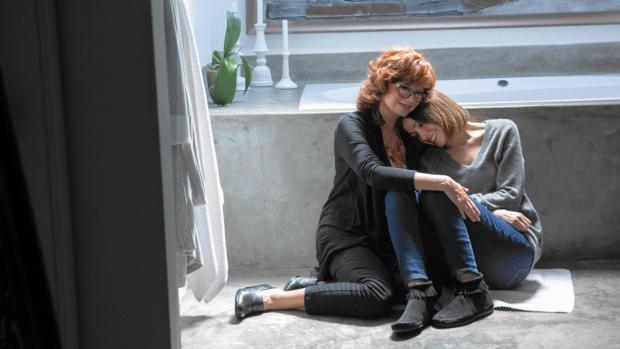Mother Knows Best: The Meddler
Writer-director Lorene Scafaria reportedly based The Meddler on her relationship with her mother after the death of her father. That likely explains why the role at first seems so ill-suited to Susan Sarandon: Armed with a thick Brooklyn accent and inserting herself into her daughter’s life like the most egregious cliché of a Jewish mother, it initially seems like a movie that would be better cast with, say, Lainie Kazan.
As the movie starts, Marnie Minervini (she’s Italian, not Jewish, though Hollywood has conflated the two at least since the 1930s) has moved to Los Angeles. Since the death of her husband, who seems to have left her more money than she knows what to do with, she wants to be closer to her daughter Lori (Rose Byrne). But Lori, who is hung up on a married man and blocked in her breakthrough writing gig, has other things to do with her time than answer mom’s endless phone calls. Like Googling “How much Valium does it take to kill yourself?”
Honestly, The Meddler does not start well at all. But stick with it. Before long, Sarandon bends it to herself and makes it into something that is, if not quite marvelous unto itself, a marvelous display for her particular talents as an actress.
As Lori escapes back east for her job, Marnie is left to fend for herself, in ways that are hard to believe. (Did Scafaria’s mother do many of these things? Life can be harder to believe than fiction.) She puts together a gay wedding for Lori’s neglected friend (Cecily Strong). She sees to the education of a computer store employee (Jerrod Carmichael). And she starts to keep company with a retired cop, played by J. K. Simmons with a name that would seem more appropriate to a 1970s porn star, Randy Zipper.
As a more romantic figure than he usually plays, Simmons is a ringer for Sam Elliott, which is appropriate given that the film is reminiscent in its cheerful tone of I’ll See You in My Dreams, last summer’s hit starring Blythe Danner as a widow adjusting to the single life. Scafaria is sloppy with her dramatics—characters come and go without having contributed much to the story, and too many things happen only to push the plot along. But the details are often delightful and the dialogue sparkling. (Parents whose children work in television are given an excellent example of a line of information that should not be shared with security personnel at airports.)
Most of all it’s an opportunity for Sarandon to shine. She’s not what you’d call underemployed, but she seldom gets showcases this good.

